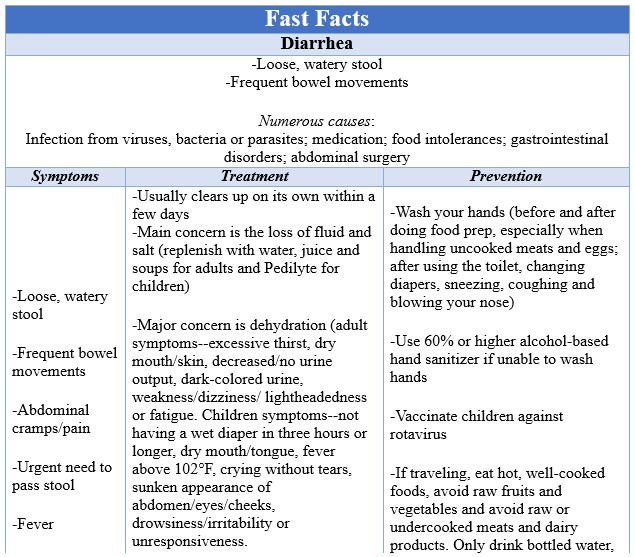That sudden urge to go!
It doesn’t matter where you are or what you are doing, but when that sudden urge to have a bowel movement hits, you know that you have limited time to find a bathroom before you have a mess in your pants. Diarrhea is definitely not a pleasant experience. Why does it happen? What can you do to prevent it from occurring?
 Definition
Definition
Diarrhea is loose, watery stool and, typically, more frequent bowel movements. It can also include abdominal cramps and pain with the urgent need to pass stool. Sometimes, depending on the cause, you will have a fever, nausea, bloating and blood in your stool. The causes of diarrhea are numerous. An infection from viruses (Norwalk, cytomegalovirus, rotavirus, viral hepatitis), bacteria (campylobacter, salmonella, shigella, E. coli, C. diff) or parasites (giardia lamblia, cryptosporidium) are common causes. Another possible cause is medication, such as antibiotics can upset the natural balance in your intestines by destroying the good bacteria along with the bad bacteria that it is supposed to be killing. This causes the food you eat to move through your digestive tract too quickly. Two other types of medications that can affect your intestinal function are anti-acids that have magnesium and cancer drugs. Sometimes, your body doesn’t tolerate certain types of food and causing them to move through your intestines quickly, as is the case for those who are lactose intolerant. Gastrointestinal disorders (Crohn’s disease, ulcerative colitis, celiac disease, microscopic colitis, irritable bowel syndrome) can cause diarrhea. Abdominal surgery can also put you at risk for diarrhea because it upsets the natural process within your body to digest food.
Treatment
Typically, diarrhea will clear up on its own within a few days without any treatment. The main concern is the loss of fluid and salt. It is important to replenish these with water, juice and soups for adults and Pedilyte for children, otherwise, you could end up dehydrated. This could be life-threatening, especially for those with weakened immune systems, the elderly or children. For adults, symptoms of dehydration can include excessive thirst, dry mouth/skin, decreased/no urine output, dark-colored urine, weakness/dizziness/lightheadedness or fatigue. For children, not having a wet diaper in three hours or longer, dry mouth/tongue, fever above 102°F, crying without tears, sunken appearance of abdomen/eyes/cheeks, drowsiness/irritability or unresponsiveness. If you have any of these symptoms and/or the diarrhea persists for longer than two days with severe abdominal/rectal pain, bloody/black stools or fever above 102°F, you need to see a doctor. Children should be seen by a doctor if symptoms don’t improve within 24 hours and/or they become dehydrated, have black/bloody stools or a fever above 102°F. For those whose diarrhea is caused by medication, your medication may need to be changed by your doctor. For anyone who has a medical condition that is causing the diarrhea, the condition will need to be addressed by your doctor. Sometimes, if your diarrhea is not going away, your doctor may prescribe antibiotics.
Prevention
The most important thing that you can do to prevent yourself from getting diarrhea is to wash your hands. This is particularly true before and after doing food preparation, especially when handling uncooked meats and eggs. It is vital to wash your hands after using the toilet, changing diapers, sneezing, coughing and blowing your nose. The proper handwashing technique means lathering your hands with soap for at least 20 seconds, which means you are rubbing the soap around all parts of your hands for the length of time it would take you to sing “Happy Birthday” twice. If you are unable to wash your hands, using 60% or higher alcohol-based hand sanitizer and rubbing both the front and back of your hands will suffice. It is important to vaccinate children against the rotavirus as they are more susceptible to it. If you are going to be traveling, it is vital to remember to watch what you eat. Eat hot, well-cooked foods, avoid raw fruits and vegetables and avoid raw or undercooked meats and dairy products. Only drink bottled water, soda, beer and wine that is served in the original sealed container. Avoid drinking tap water and having ice cubes in your beverages. Drinks, such as coffee and tea, that are made from boiled water should be safe as long as the water has been heated thoroughly. (Note: if you have diarrhea, avoid alcohol or caffeinated beverages because they will aggravate it.) Remember, to use bottled water to brush your teeth and keep your mouth closed while showering. If you have a weakened immune system, your doctor may recommend taking antibiotics before you go on your trip. It is a good idea to check travel warnings before you go. The Center for Disease Control has webpage that discusses travel health concerns around the world at https://wwwnc.cdc.gov/travel/notices/
Diarrhea can definitely be challenging. It is usually manageable and now you have the information you need to decrease the chances of yourself and those you care about from having diarrhea. If you have any questions or concerns about diarrhea, please speak with your doctor. If you would like more information, please visit the National Institute of Health’s page about diarrhea at https://www.niddk.nih.gov/health-information/digestive-diseases/diarrhea